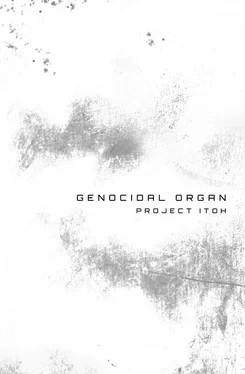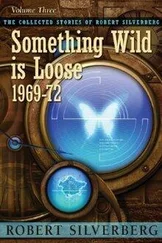Project Itoh - Genocidal Organ
Здесь есть возможность читать онлайн «Project Itoh - Genocidal Organ» весь текст электронной книги совершенно бесплатно (целиком полную версию без сокращений). В некоторых случаях можно слушать аудио, скачать через торрент в формате fb2 и присутствует краткое содержание. Год выпуска: 2012, ISBN: 2012, Издательство: Haikasoru/VIZ Media, Жанр: Старинная литература, на английском языке. Описание произведения, (предисловие) а так же отзывы посетителей доступны на портале библиотеки ЛибКат.
- Название:Genocidal Organ
- Автор:
- Издательство:Haikasoru/VIZ Media
- Жанр:
- Год:2012
- ISBN:9781421550886
- Рейтинг книги:4 / 5. Голосов: 1
-
Избранное:Добавить в избранное
- Отзывы:
-
Ваша оценка:
- 80
- 1
- 2
- 3
- 4
- 5
Genocidal Organ: краткое содержание, описание и аннотация
Предлагаем к чтению аннотацию, описание, краткое содержание или предисловие (зависит от того, что написал сам автор книги «Genocidal Organ»). Если вы не нашли необходимую информацию о книге — напишите в комментариях, мы постараемся отыскать её.
Genocidal Organ — читать онлайн бесплатно полную книгу (весь текст) целиком
Ниже представлен текст книги, разбитый по страницам. Система сохранения места последней прочитанной страницы, позволяет с удобством читать онлайн бесплатно книгу «Genocidal Organ», без необходимости каждый раз заново искать на чём Вы остановились. Поставьте закладку, и сможете в любой момент перейти на страницу, на которой закончили чтение.
Интервал:
Закладка:
Most of them would probably make a full recovery, of course. But I didn’t know about my mother yet.
The black homing beacon crept on and slid underneath one of the sets of curtains, so I parted them and went through.
I saw a morass of tubes and monitors. The tubes that plugged into my mother’s body were there to pump in life-giving nanomachines to make up for whichever of her internal organs had given out. Her normally luxuriant hair had been completely shaved off, and the gash in her head was sewn up, stapled, and covered in hemostatic pads dripping with blood. There were also a number of places on her shaved skull where somebody—a doctor, probably—had written notes in shorthand, presumably to indicate where to aim the electromagnetic waves that would guide the nanomachines to their destinations inside her skull. I was reminded of Post-Its on a refrigerator door or of the clutter at Williams’s house that was punctuated with week-old memos to self: Don’t forget to pick up the groceries . A whole corner of his kitchen was dedicated to such notes. And then there were those police procedurals on TV, with the detective’s desk in organized chaos …
Yes, I was reminded of all of these by the jottings on my mother’s shiny head, which now looked liked a bizarre modern version of those old phrenological models.
I wasn’t sure how long I stood there in front of my mother. At some point I heard a gentle voice— Captain Clavis Shepherd? —and I turned around to see who had spoken.
The man introduced himself as my mother’s attending physician.
I asked about my mother.
She had multiple fractures and extensive subcutaneous bleeding. Many of her internal organs had been damaged to the point of impaired function. Nothing, though, that the technology couldn’t keep stable. Her life was not in immediate danger.
I didn’t press him on his precise definition of “life.” What “life” currently meant for my mother as she lay there, on her side, oblivious to the world.
“Is she conscious?” I asked, and I noticed the doctor’s lips tightening. At the time, I read the doctor’s expression as a sign that I should give up all hope for that, but looking back on it now I realize that I was subtly wrong on that count. His troubled expression was probably more that of a specialist trying to search for the right words with which to explain the nuances of a difficult and complicated situation to a layman. A situation I was somewhat familiar with as a specialist in my own field. What to do when friends or family—or even desk jockeys within your own organization—asked you for a yes or no answer when there were only shades of gray. For every subtle and complicated question, there was an answer that was perfectly simple, straightforward, and wrong.
“Unfortunately, that’s not an easy question to answer,” the doctor eventually said. “Your mother suffered from severe blunt-force trauma directly to her head, resulting in what is known medically as a cerebral contusion. She has a comparatively small area damaged on the side that was hit, but the damage on the other side is much more extensive, with multiple microhemorrhages deep inside her brain.”
“I don’t understand—on the other side?”
“If you can forgive a somewhat insensitive analogy, it’s a bit like hitting a billiard ball with a cue. The area you hit is quite small, but when the ball then hits the cushion on the other side there’s a lot of force absorbed. When the brain is hit in this manner, it has nowhere to go except into the hard skull wall on the other side …”
A billiard match inside my mother’s skull but with a cue ball as soft as marshmallows.
The doctor went on to explain that, as a result of the trauma, the part of my mother’s brain around her neocortex was severely damaged. She had lost her respiratory function entirely, although that could be artificially maintained with the machines.
“Mr. Shepherd. We’re able to isolate the different functions of the cerebral cortex into separate compartments. Modules, if you will. And we can confirm that many of your mother’s cerebral cortex modules are still alive. We can even positively identify which ones. But …” The doctor hesitated.
“But?”
“Well, medical science just doesn’t have any frame of reference to help us determine which and how many modules need to be alive before we can describe the person as being meaningfully ‘conscious.’ In the same way that medical science can’t describe what it’s like to be dead.”

My mother’s house. The house that had once been my home.
The house was in a quiet corner of Georgetown, not too far from the Exorcist Steps, named after the old movie. The steps had always been covered in graffiti, sometimes of a pretty creative variety. Once, around the time I was in high school, someone covered the whole surface of the steps with display paint and projected an image of Father Karras tumbling to his doom, looped over and over. The incident was briefly on the network news, I remember.
I opened the door. The place smelled of my mother. Her life. Her air.
“Anybody home?” I found myself muttering under my breath, out of habit. The house had always been a place of words. Now silence prevailed.
I started walking around the place that should have been my own home. I felt like a detective looking for evidence, or even a thief. My own room was still there, kept in place. I ran a finger across the surface of my old desk. There was hardly any dust. The room had been cleaned regularly.
Eyes , I thought to myself.
This house was a pair of eyes. My mother’s eyes, watching over me to make sure I didn’t suddenly disappear like my father. I grew up under the gaze of those eyes. Even when Mom was out of the house and I was in the living room on my own, on the network, I still always felt something over my shoulder.
My mother had been an expert at tracing my movements. Nothing escaped her—it was uncanny. What candy bar I’d been eating, which of my friends I’d been secretly hanging out with—there was always something in the house that would give me away and land me in trouble.
I sat down on my bed, the bed that had once been mine. She would have made an excellent tracker, I thought to myself, and almost burst into laughter at the thought.
This had been my mother’s world.
The world of a hundred eyes focused on a single objective: to make sure a person would never disappear.
At some point that world became stifling, suffocating. That was why I joined the army and signed up for Special Forces. Well, you got what you wanted, didn’t you, Clavis Shepherd? Plenty of danger, more dead bodies than you could shake a stick at. And you’re not dead yet! You’ve even lost a comrade—admittedly due to suicide rather than in the field, but hey, it still counts. You’re the real deal. What more could you want from life?
I forced myself to stop thinking. I was afraid of where it would lead me.
I went into the kitchen. It, too, was clean and orderly. Not a single magnet or memo on the refrigerator door, a fact I found eerie.
My mother didn’t like photographs. There were no framed pictures in the living room. It occurred to me that I had never seen a single photo of my father. There probably wasn’t a photo anywhere in the entire house—not of my father, not of my mother, not of me.
I wondered if there would be anything on Mom’s server space. If I were to log in, would I have found us all there, safely preserved and easily accessible?
The wallpaper was still the same as when I was a kid. It had yellowed a little with age, but remained neat and clean. I tapped a wall with my fingertips to bring up an access port. I tried to see if I could log into my mother’s account, but—obviously—I was asked for authentication, which I couldn’t provide.
Читать дальшеИнтервал:
Закладка:
Похожие книги на «Genocidal Organ»
Представляем Вашему вниманию похожие книги на «Genocidal Organ» списком для выбора. Мы отобрали схожую по названию и смыслу литературу в надежде предоставить читателям больше вариантов отыскать новые, интересные, ещё непрочитанные произведения.
Обсуждение, отзывы о книге «Genocidal Organ» и просто собственные мнения читателей. Оставьте ваши комментарии, напишите, что Вы думаете о произведении, его смысле или главных героях. Укажите что конкретно понравилось, а что нет, и почему Вы так считаете.












